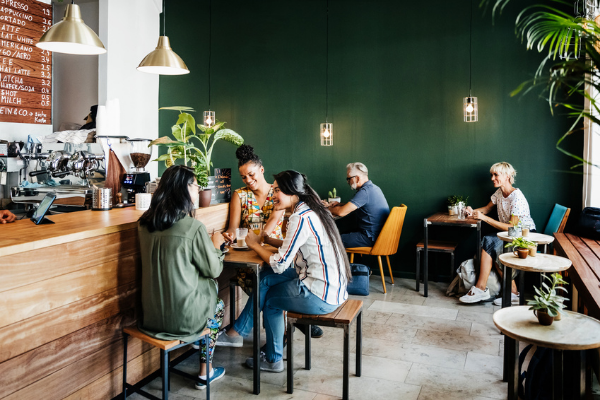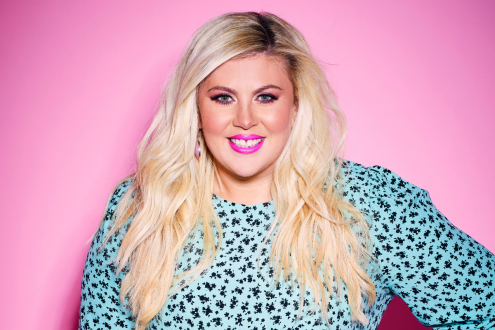How to overcome overwhelm: Dossier special
Do you struggle with an ever increasing to-do list that feels overwhelming? Is life just too busy some days? In this six-part dossier, discover strategies to help you lessen stress and bring more calm into your life

The other day, I had a meltdown in my local hardware store. I went in to make a simple purchase – a new bulb for the hall lamp. Alas, this was no longer a straightforward errand. Did I need an LED or an eco halogen bulb? How many lumens was I looking for? Was I interested in a smart wifi-enabled dimmable bulb with colour-change option? It was all too much and, close to tears, I slunk home feeling downcast and useless.
It might sound trivial but the experience was a wake-up call – a lightbulb moment even… Evidently I had reached a tipping point and was in danger of becoming totally overwhelmed with the minutiae of daily life. I felt like a fraud for talking to anyone about it. After all, what did I have to feel overwhelmed about? It’s not as if I’m a key worker facing long shifts with people’s lives in the balance.
Whatever the reasons, while surveying the towering piles of books, papers and mail taking over every surface of my living room, I knew I needed to take action.
In her viral BuzzFeed post on millennial burnout, the writer Anne Helen Petersen coined the phrase ‘errand paralysis’, which seems to perfectly sum up one of the major symptoms of our collective overwhelm regardless of age. Errand paralysis is the syndrome where you keep moving items from one to-do list to the next without ever taking action.
As Petersen describes it: ‘None of these tasks was that hard: getting knives sharpened, taking boots to the cobbler, getting my new dog a microchip, sending someone a signed copy of my book, scheduling an appointment with the dermatologist, donating books to the library, vacuuming my car… Emails festered in my personal inbox, which I use as a sort of alternative to-do list, to the point that I started calling it the “inbox of shame”.’
All this sounds horribly familiar to me. Since when did we stop being able to cope with the business of life, and what can we do about it?
Create a calm mindset
If everything seems to be getting on top of you, it’s pointless charging ahead with a battle plan. Instead, take a couple of days to focus on attaining a calmer state.
‘A helpful thing to do is a body scan meditation,’ suggests Audrey Tang, a psychologist. ‘It’s a lovely practice that keeps us calm and gets us deep breathing. Starting from your feet, go through each part of your body, tensing and relaxing each in turn. Recognise how you feel. Notice those areas where you’re holding tension, and release.’
Tang also likes to tackle overwhelm with a daily gratitude stretch. ‘I stretch my legs and think of all the people in my life I’m grateful for. Then I stretch out my arms and I think of all the things I’m grateful for. Over the week, I guarantee you, certain patterns will arise. There will be certain people who always crop up and others who never crop up.’ Tang suggests that in this way we can start to actively seek out the people and things that matter most to us, and spend less time on the ones that don’t.
 Another mindset tool is to become aware of rigid thinking patterns. Alice Boyes, the author of The Healthy Mind Toolkit, suggests that we pay special attention to what she calls ‘sneaky, self-imposed rules’. ‘By these, I mean the type of rules that inevitably create overwhelm,’ says Boyes. ‘For example, if you feel you must make three types of Christmas dessert every year…
Another mindset tool is to become aware of rigid thinking patterns. Alice Boyes, the author of The Healthy Mind Toolkit, suggests that we pay special attention to what she calls ‘sneaky, self-imposed rules’. ‘By these, I mean the type of rules that inevitably create overwhelm,’ says Boyes. ‘For example, if you feel you must make three types of Christmas dessert every year…
Actually, you can make just one. Or if you have the idea that when someone asks you for a favour, you must always say yes. Do you really have to say yes?’
She points out that rigid thinking might help you stick to your goals today, but it won’t be sustainable because flexibility allows for self-care in the moment. For example, say you believe you can only get fit if you run every day. Then one day you have to attend a conference in another city. You arrive late so really should go to bed and get some rest – but instead you force yourself to go to the hotel gym and then sleep badly. ‘That’s not helpful,’ says Boyes.
When clutter is so much more than clutter…
Perhaps the most obvious manifestation of an overwhelmed life is clutter. By clutter, I’m not talking about the glamorous type involving 10 pairs of party shoes and military campaigns to reorganise your sock drawer, such as those in the realm of Marie Kondo, the famous organising consultant.
The clutter of overwhelm is what the author of From Clutter To Clarity, Kerri Richardson, calls ‘a temper tantrum of the soul’ – basically, all the stuff our stressed-out brains just can’t deal with any more.
Looking around my home, I am surrounded by this stuff – online shopping returns, forms that need signing, documents that need shredding in my ‘one page at a time’ shredder, magazine articles I might read, recipes I might cook… Every time I look at the growing pile, I want to cry.
A growing stack of mail is what I like to call “symptomatic” clutter,’ says Richardson, when I explain my problem. ‘You’d like to have it out of your life but you just can’t seem to take the action to get rid of it. There’s something more going on than the mail. At the root of it, there’s always one of three things – unrealistic expectations, limiting beliefs or the need to set boundaries.’
She suggests that I look at the pile of mail and identify the stories I’m telling myself. Maybe there are bills I can’t pay or a letter from someone I don’t want to hear from… Is there something in that pile that I’d rather not deal with? She’s right about that – there is a document that, once signed, might lead to a difficult decision.
 ‘Clutter can be a fantastic distraction, and also an excuse to avoid taking action,’ says Richardson. ‘Take on the role of investigator. Get curious about what your resistance is about. What are you avoiding? What can help you move forward. Do you need more information? Do you need help from a professional?
‘Clutter can be a fantastic distraction, and also an excuse to avoid taking action,’ says Richardson. ‘Take on the role of investigator. Get curious about what your resistance is about. What are you avoiding? What can help you move forward. Do you need more information? Do you need help from a professional?
‘No’ is a complete sentence
One other common source of overwhelm is other people, even those we love the most. ‘I’m seeing people struggle with this, particularly as we try to return to normal after lockdown,’ observes Tang. It’s definitely something I’ve battled with, trying to strike a happy medium between rest and peak socialising.
‘This is where we have to get really honest with some people,’ says Tang. ‘A lot of us have changed our perspective during lockdown and may no longer enjoy doing the things we did before. For example, I’ve started replying to friends who invite me to their amateur dramatics productions with words along these lines: “I’m happy to come – I want to support you and love seeing my friends, but I wouldn’t want to go otherwise.” This sends the unspoken message that you don’t want to be invited to the number of events you once attended.’
In general, it can be helpful to have an idea of how you are going to say no to the invitation or request for help. ‘The first step is getting clear on what your priorities in life actually are, and these change all the time,’ says Tang (see ‘Focus wheel’ section below). Once you know what you want out of life, what you enjoy doing most and with whom, you can actively seek more of those experiences. Then the next time someone invites you to take part in a sponsored 10k or asks you to volunteer at the community garden, you will be more conscious in the moment that you don’t have time for that.
‘It’s much easier to say “I’m sorry, I’m actually too busy” when you are fully engaged in what matters most in life,’ says Tang. ‘Even with close friends, I am now able to say that, much as I’d love to see them, I want to spend my free time with my dad right now. One thing that really helps is to rehearse what you’re going to say ahead of time – we only get good at something with practice,’ she says.
‘The other thing that is useful is to buy yourself time. So if someone invites you somewhere or asks a favour, don’t jump to respond, especially if you’re a people pleaser. Instead, tell them you’ll get back to them by the end of the day or tomorrow.’
How should we handle the person who is perpetually asking for favours? ‘Communicate a clear time limit. If agreeing to help, tell them you can do the thing at 3pm on X date and can spare 30 minutes. Or you could give them a template – forward them an instructional video or online resource that might empower them to help themselves.’
Connect with a broader circle
One aspect of the pandemic that created a sense of overwhelm in many people is loneliness. ‘Feeling isolated decreases our perception of social support,’ says Boyes. ‘The more you expect people to reach out to you, the less support you feel you have. Feeling unsupported contributes to feelings of overwhelm.’

But often when we’re struggling to cope, we imagine that it’s only appropriate to reach out to our nearest and dearest. ‘We can overlook other great sources of support – people we went to school or university with or former colleagues. Not only can they offer fresh perspective, the people closest to us can soon become fatigued by hearing your problems on repeat. They’ve heard it all before, it’s boring and if they communicate that to you even unwittingly, it can feel invalidating,’ says Boyes.
By confiding in what’s known as ‘weak ties’, you will more than likely present your story in a slightly different way. ‘You tend to be a bit more proactive and take more responsibility for yourself when talking to people you don’t know as intimately. And an added bonus is that people from diverse backgrounds may offer more original insights and solutions than your closest associates who are likely to think in a similar way to you.’
This makes perfect sense to me. Who knows, maybe there’s even someone in my wider network who can advise me about LED lightbulbs!
Project-manage your to-do list
If you are tackling a large task, it is easy to procrastinate until you’re feeling inspired. This, however, isn’t helpful in moving forward. Boyes recommends that in this scenario you halve your daily workload.
‘The mistake a lot of people make is working themselves to exhaustion on a project. But research shows that your strongest memories of an activity are at the peak and how you felt at the end. So if you feel depleted at the end, it will be much harder to get back to it the next day.’
Another trick Boyes suggests is to tackle familiar tasks first. ‘Sometimes, when you are struggling, you need behavioural activation that boosts your mood a little – then you can move on to something challenging.’ If you are procrastinating over a difficult job, Boyes recommends that you describe what needs to be done as if you were outsourcing the project to someone else. ‘This works especially well if you are a perfectionist because when you’re giving a task to another person, you will likely simplify it and not have such impossibly high standards.
‘Also, research shows that you’re more likely to succeed if you set an “implementation intention” – essentially preparing the road ahead. In one study, students who decided when and where they were going to write their essay were more likely to do it. People underestimate how much planning and sequencing – basically, project-management skills – contribute to successfully completing a task. If a task is unfamiliar, we don’t know how to break it down into concrete steps.’ Another surprising tip is to do something physical before a mentally challenging task.
 ‘Research shows that using muscular strength is good for focus. Every Monday morning, I move furniture around the house to vacuum and that sets me up for the week,’ says Boyes.
‘Research shows that using muscular strength is good for focus. Every Monday morning, I move furniture around the house to vacuum and that sets me up for the week,’ says Boyes.
Focus wheel
Use this technique, based on the classic coaching tool, the wheel of life, to identify time spent on tasks that don’t light you up, and create more space for things that energise you.
We can end up focusing too much on our competencies – the things we’re good at but don’t love doing, as opposed to our strengths – the activities during which we’re happiest and most effective. Say you’re good at baking cakes or figuring out tech, so people always ask for your help in those areas. You might be great at them, but perhaps those tasks exhaust you. However, because you are praised for your ability, you’ve lost sight of what you truly enjoy doing.
A way to find a balance of strengths and competencies is to create a wheel of life. Draw a circle and divide it into eight segments. Traditionally, coaches use this exercise to mark out life categories – work, family, relationships, health and so on, so clients can find harmony in life. I use it to get people to choose eight areas that are really important to them – it might be the aforementioned list, but it may include fashion, art, reading, gardening and creativity. The idea is that you mark on the wheel from 0 (the centre) where you are in terms of time devoted to the activity (with 10 being the maximum).
By creating the wheel, you begin to focus on what’s really important to you, as opposed to what other people tell you is important. It’s a wake-up call.
Say you feel family is important to you, but time spent on family is only at a 2, whereas work is a 10… With a visual representation of what’s important to you and how much time you spend on it, you can work to change how you use your time and beat overwhelm.
‘I learned to prioritise and simplify’
Tackling overwhelm is an ongoing process for Louisa Burford, who shares her methods.
Rushing to make the children dinner after a hectic workday, I could feel a familiar bubble of stress rising inside me,’ says Louisa Burford, 48, a freelance psychology translator.
‘It happened every few months when life became a treadmill of tasks and it all got too much for me,’ adds Louisa, who is originally from Sutton Coldfield and lives in Madrid, Spain, with her husband and two sons, aged 14 and 12.
‘My mind would fill with negative thoughts as I ruminated about the jobs I had to complete and the burdens I felt were being placed on me by others. I was grumpy and snappy and, I’m embarrassed to admit, played the victim too,’ she says. ‘But luckily, I’d learned over time to recognise those negative emotions for what they are and what actions to take to overcome them when necessary.
‘Whenever I became overwhelmed, I told myself to prioritise, simplify and lower my standards – as well as find half an hour just for me,’ she explains.
‘The fi rst time I struggled with being overwhelmed was when my children were very young. We had just moved cities and my husband, Alejandro, was working longer hours. I had two boys under the age of two to look after, with no family nearby to help as I tried to juggle motherhood with my business.
‘Even though we have a pretty balanced relationship, I was taking on the lion’s share of tasks at home, partly because I was there more of the time, but also out of force of habit. I’d see other mothers taking on those jobs and get a case of “comparison-itus”. It also meant I was shutting out Alejandro, taking too much control and not giving him a chance to share the burden for fear of standards slipping,’ she says.
When things came to a head for her emotionally and she felt overwhelmed to the point of feeling unwell, Louisa knew that she had to make changes.
‘It was a big lesson about the benefits of lowering the bar and how it was kinder to everyone,’ she explains. ‘I started to consciously pass tasks to Alejandro, although I still need to remind myself to do that sometimes.
‘The other realisation I had was the importance of alone time and “social rest” for my sanity,’ says Louisa. ‘I didn’t appreciate how motherhood would affect that part of my life, so hadn’t kept myself as balanced and happy as I might have done.’
So what action did she take to find peace? ‘I started to actively carve out solo time, even if it was just for a walk,’ she says.
‘Over the years I’ve developed other strategies, such as preparing for the day ahead the previous night and meal planning at the weekend, with a few emergency dinners up my sleeve for days when things go to pot.
‘Identifying my priorities by writing down my “Most Important Tasks” has also helped, along with creating a time log for my day. This is a simple sheet of paper containing three columns – “Time”, “Focus” and “Later”. The latter is anything that comes up to distract me while I am focusing on my main task, so I can note it down and return to it at a better time.’
And how are these mechanisms working in the long term? ‘The pandemic put my coping strategies to the test. I was incredibly stressed during the fi rst lockdown, worrying about my family in Britain. My husband navigated the juggle of being at home better than I did. I fell into the trap of feeling as if I couldn’t complain because we were “lucky” to have a comfortable house, and I neglected to fi nd the alone time that I needed.
‘Eventually I realised I needed to help myself though my overwhelm, so I took the “High vibe journey” course by Kelly Pietrangeli, which is about conscious living. It changed my mindset completely, helping me break unhelpful patterns and procrastination.
‘Overcoming overwhelm is a work in progress, but nowadays it’s a lot easier and quicker to dust myself off after a big meltdown,’ says Louisa.
‘Most of all, I cut myself some slack, find some headspace and, before I know it, I’m back on track.’
Heartful Spanish is Louisa’s podcast for all levels of Spanish learner.
With thanks to our experts…
Audrey Tang is a psychologist and author of ‘The Leader’s Guide To Resilience’ (Pearson, £14.99).
Alice Boyes is a former psychologist and researcher turned writer. She is author of ‘The Healthy Mind Toolkit’ (Random House, £11.99).
Kerri Richardson is a lifestyle designer, coach and author of the bestselling book ‘From Clutter To Clarity’ (Hay House, £12.99).
Words: Anita Chaudhuri, Alex Lloyd (Louisa Burford interview) and Audrey Tang (Focus Wheel)
Photographs: Getty Images









